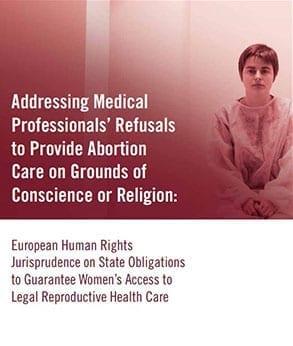United Nations Calls on Perú to Expand Access to Legal Abortion
Committee on the Elimination of Discrimination Against Women (CEDAW Committee) Cites Denial of Legal Abortion Services As Human Rights Violations
(PRESS RELEASE) The United Nations (U.N.) has called for the Peruvian government to liberalize its current abortion law and to address human rights violations, including the denial of legal abortion services and gender-based discrimination faced by women when they seek legal recourse.
In recommendations released this week by the U.N. CEDAW Committee, committee members recognized Perú’s long history of denying women access to legal abortion and failure to provide comprehensive individual and general reparations in the cases of L.C. and K.L. In these cases, adolescent women were denied legal, therapeutic abortions. The CEDAW Committee also called on Perú to permit legal abortion in cases of rape, incest, and severe fetal impairments. Currently, abortion in Perú is legal only when the health or life of a woman is at risk.
Last month, Perú adopted a national protocol for safe abortion services to provide clarity for physicians and patients on legal therapeutic abortion in the country, ninety years after therapeutic abortion was decriminalized. State officials announced the policy change leading up to Perú’s evaluation at CEDAW Committee’s 58th session in Geneva, Switzerland. The CEDAW Committee recommended that Perú disseminate the abortion guidelines included in the protocol to all health staff.
Said Nancy Northup, president and CEO at the Center for Reproductive Rights:
“Once again, the United Nations has underscored the vital principle that women’s reproductive rights are fundamental human rights, which include the right to safe and legal abortion care.
“The experiences of Peruvian women denied the health care that is their fundamental right are inexcusable and must not be repeated in other women’s lives.
“While Perú has taken some recent steps toward expanding the rights of women, it’s nowhere near enough. Now is the time for the Peruvian government to build on this progress and bring forth legislation that will truly expand women’s access to critical reproductive health care.”
In its observations, the CEDAW Committee expressed concerns about the significant barriers low-income and marginalized women face seeking legal recourse in national, regional and international courts—highlighting L.C. and K.L.’s cases. It called on the State to train police, judges and lawyers on its human rights obligations, specifically women’s human rights and the right to gender equality.
“Women in Perú have been denied access to safe, legal, and often life-saving abortion services for far too long,” said Mónica Arango, regional director for Latin America and the Caribbean at the Center for Reproductive Rights. “The United Nations has made it abundantly clear that Perú must work quickly to implement its new therapeutic abortion guidelines and immediately provide comprehensive reparations to L.C., K.L., and their families for the suffering caused by their government’s failure to provide essential medical care.”
According to the CEDAW Committee, Perú must also ensure the availability of abortion services and quality post-abortion care. The CEDAW Committee also recommended that Perú ensure access to family planning services, in particular in rural areas, and adopt all the necessary measures to carry out the free distribution of emergency contraceptives within the public health system, particularly to survivors of sexual abuse.
The Center for Reproductive Rights, Planned Parenthood Federation of America and Perú-based PROMSEX submitted a report to the CEDAW Committee, addressing the human rights concerns stemming from Perú’s restrictive abortion law, lack of access to emergency contraception within the public health system, and limited sexual and reproductive health services for adolescents.
“Women’s health advocates have systematically denounced how the reproductive rights of women and girls in Perú have been trampled for too long,” said Rossina Guerrero, Director of Political Advocacy at PROMSEX. “Now with the global spotlight on human rights violations in Perú, the government must work diligently to put the therapeutic abortion guidelines into action so that safe abortion services are a reality for Peruvian women.”
Currently abortion in Perú is legal only when the health or life of a woman is at risk, and not in cases of rape. The devastating impact of criminalizing abortion in cases of rape is particularly far-reaching in Perú, which has the highest rate of reported rape in South America. Peruvian girls and adolescents account for an overwhelming proportion (78 percent) of rape cases and, adding insult to injury, public health services are prohibited from distributing emergency contraception.
A study by the World Health Organization and the Guttmacher Institute reinforced the fact that restrictive abortion laws are not associated with lower rates of abortion. According to the study, the 2008 abortion rate in Latin America—a region where abortion is highly restricted in almost all countries—was 32 per 1,000 women of childbearing age, while in Western Europe, where abortion is generally permitted on broad grounds, the rate is just 12 per 1,000.

